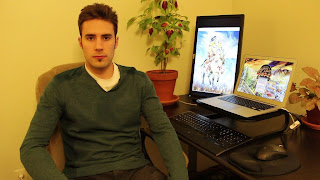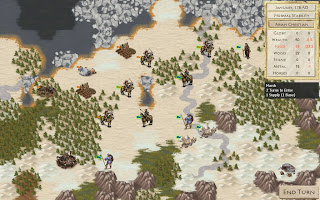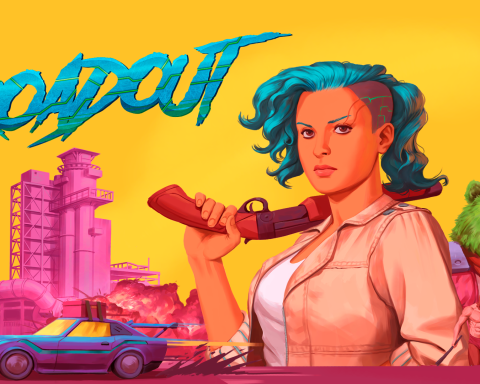One of the more interesting Kickstarter projects in recent months is Jon Shafer’s (and his new studio, Conifer Studios) At the Gates. It has well and truly hit its goal, but there’s still a couple of days left to make a pledge if you’re looking to get in on the action.
For those who don’t know who Shafer is, he’s the head honcho behind the rather excellent Civilization V, and one of the true advocates for strategy gaming in the industry. After Firaxis and a brief stint at Stardock Corporation, Shafer has decided to go down the indie path and has set up his own studio, with At the Gates to be its first release. Excitingly, along with the expected PC and Mac releases, At the Gates will be ported to the iPad – a platform perfect for strategy games, but so far underserved by the genre.
He took the time out to sit down with us and chat about the drivers behind his decision to “go indie,” his hopes for At the Gates and strategy games, and his advice for other developers looking to do their own thing.
Digitally Downloaded (DD): What are your goals for the next 12 months?
Jon Shafer (JS): Well, we have the gameplay prototype wrapped up so most of the game is fully-functional. On the gameplay side we’ll be fleshing out diplomacy and the AI, followed by a tonne of playtesting and iteration. With art we’ll be nailing down the final style for the game as a whole, adding animations to the units and map and finishing up the bulk of the leader paintings. And on tech we’ll be sorting out the details for getting At The Gates (AtG) on other platforms, adding the promised modding capabilities and implementing miscellaneous systems such as hotkeys and multi-turn moves.
DD: What encouraged you to set up Conifer Games?
JS: Both Firaxis and Stardock are filled with some amazing people, and the decision to strike off on my own was a very difficult one. At the end of the day, Firaxis was part of a much larger entity, and that inevitably results in less flexibility. As much as I enjoyed my time there, in order to grow as a designer I had to move on.
There’s a unique role at Firaxis that is almost non-existent elsewhere – the lead designer/programmer. Instead of a team of designers and a team of gameplay programmers, all of these duties are wrapped up into this one single job. Needless to say, it’s a daunting amount of work, but the end result has been some of the greatest strategy games of all time. Strategy games are the most complex and system-based out of any genre. If you have different people designing and building those systems it’s going to be much, much harder to produce a cohesive whole. I was stretched pretty thin on Civilization 5 between my duties on the game, managing a team of 50, setting the project’s direction, etc. As a result, I do think that Civ 5 suffered to some extent.
Stardock is also a great place to work, especially as a designer. When one of our major projects was getting underway, I made the choice that I wouldn’t do any programming on that game, as staying on top of the high-level issues needed to be my priority. This was a pretty radical shift for me, as I was obviously heavily involved in the coding of Civ 5. But crafting the design and managing a large team while also programming the gameplay is just too much for one person to take on and still produce quality work.
However, I eventually came to the realization that I really missed getting my hands dirty in the development. While I love working directly with great people, my true passion is creation. With Stardock having several major products already in the pipeline it wasn’t feasible to completely switch gears. Adding programming to my existing duties was now even less realistic than it was on Day 1. I came to the conclusion that there was one way to get where I wanted to be: starting my own company. Fortunately, the emergence of Kickstarter and the innumerable opportunities to sell your games digitally means there’s never been a better time to start up an indie studio.
DD: Coming from Civilization, you’ve stuck with your love of strategy games with Conifer. What attracts you to the genre?
JS: I originally got into gaming because of my interest in history and maps, and that’s really stuck with me ever since. Many of my earliest experiences were with games like Panzer General and Imperialism, and that’s what I’m naturally drawn to. I have trouble playing these types of games for fun now, but developing them is far more enjoyable anyways!
Strategy gaming is also a space that is not explored by very many developers, at least compared with first-person-shooters and RPGs. Creating massive empire builders like Civ is a tall order but thanks to my past work I’m one of the few people who has the skillset to do so. So not only is it fun, but it’s also good business!
DD: Are you concerned that as the games industry becomes more challenging for the big publishers, the more niche genres, such as serious strategy games, will continue to be pushed to the periphery?
JS: I actually believe the opposite is the case. There’s no doubt that the audience for strategy games is not as large as that of other genres, and that naturally pushes the larger companies away from them, as they are constantly on the hunt for “hits.”
But that does not mean these games can’t do really well and make a lot of money. As the industry shifts towards a larger number of smaller studios you’ll see this underserved market fill back up. Kickstarter and digital distribution means that these days anyone with a computer and the talent to make games can do so. That was not the case even five years ago when the bar for setting up your own company was much higher.
DD: Your Kickstarter has had a wonderful reception from the community. What do you attribute the success to?
JS: I’ve touched on it a bit already, but strategy games are still quite popular in spite of the relatively small number of titles released each year. So there’s built-in interest for any new game that looks like it will have a good chance of being released and turning out well.
As for AtG specifically, I like to think that our the unique elements we’re bringing to the table are a major draw. The theme of barbarians trying to take down Rome is almost completely new ground for a large strategy game. Plus, we’re incorporating some really exciting features like map evolution and depleting resources which help make the game more challenging the further in you get, instead of easier, which is typically the case.
Sequels might get more attention, but truly innovative games will also attract a very passionate group. We’re really trying to push the envelope with AtG and I think the success of our campaign thus far shows that people appreciate this.
DD: At the Gates is in development for the major PC operating systems, as well as the iOS App Store. How difficult is it for a startup developer to stretch a game to enough platforms to reach the maximum number of gamers?
JS: It’s a tough call. You never want to bite off more than you can chew, but you also want to be aggressive about exploiting opportunities. Linux and Mac were not too difficult as there’s a middleware solution which basically allows us to flip a few switches and get the game running.
iOS is quite a bit more difficult, if only for the interface challenges and performance implications. An iPad obviously does not have the same processing power as a modern PC. But the advantage we have with AtG is that it’s turn-based, 2D and relatively “lightweight.” I’m sure there will be some hiccups along the way, but a game like AtG is a natural fit for tablets. I know I love my iPad and wish there were more of these types of games available, and hopefully I’m not the only one who feels that way!
DD: How will you approach the marketing of this game post-Kickstarter?
JS: Well, being a small indie studio means that we’re not going to have a lot of commercials on during the Super Bowl, so we have to be a little creative.
I have been writing on my personal website for about a year now and plan on continuing to do so for as long as I have something to say! I’ll be talking a lot about the progress on AtG, the challenges I’ve had to overcome and changes I’ll be making along the way. I really believe that fans and supporters really appreciate this approach, as it gives you a completely unadulterated look into how the project is being developed.
Beyond that – who knows! When the game is further along I’m sure I’ll be chatting with folks to see if they’d like to check it out, but as of right now we don’t have any concrete plans.
DD: What happens after At the Gates?
JS: Well, at the very least the hope is that AtG does well enough that Conifer can keep making games! Because of how much I enjoy being hands-on with the creation of games I don’t expect the company to ever grow beyond five or so people. As long as you’re focused you can create amazing games with a small team, and the perks of growing and massively increasing scope don’t really appeal to me.
It’s obvious that having only a few developers limits what you can do, but what people don’t realize is that the reverse is also the case. If you have 15, 50 or 200 employees to pay every couple weeks it means you have to pursue only the projects you think can sell huge quantities. That’s not a problem I want to worry about.
As for what titles we might work on, I’ve got a couple cool ideas brewing, but nothing I can talk about yet!
DD: What advice would you have for a game developer looking to set up his own studio?
JS: The most important thing is to start small and build up over time. Work on the side if you can. Learn as much about the demands of doing so before taking the plunge. Build contacts with the media so that they can help spread the word when you are ready. Preparation is key.
And make sure you’re realistic with your expectations. Running a company is not easy, and it can be expensive. You might have to eat ramen for a few years, and yes, there’s a chance you fail completely. But if it’s a goal you really want to pursue you have to be willing to make it your life. I’m a big fan of being ambitious and trying things out, as that’s what makes life fun, and even if it does not work out at least you have learned something along the way!
DD: Finally, what games are you playing at the moment?
JS: I have been playing a ton of Spelunky on XBLA lately. I finally won on my 998th game, and am now trying to beat it in the hardest possible way. Not easy, let me tell you!
I’ll also be getting back to Persona 4. I was about 60 hours in before I had to buckle down for the AtG announcement, and I’m hoping to get back and wrap it up here in the next few weeks.









